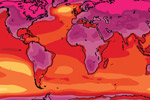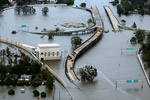Today is Earth Overshoot Day, according to the Global Footprint Network and WWF’s Living Planet Report, which means the seven billion people on Earth have consumed the globe’s renewable resources for the year. In other words for the next 133 days humanity will be accumulating ecological debt by overdrawing on our collective resources.
“Simply put, we are asking for more than we have available,” said Jim Leape, Director General of WWF International. “Nature is the basis of our wellbeing and our prosperity—but we are using up way too much of the Earth’s finite resources.”
WWF and Global Footprint Network track renewable resource-use like fisheries, forests, land use, and greenhouse gas emissions to track just how quickly global civilization runs into the red. Once the limit is hit, society begins to deplete natural resources, a practice which is helping to drive biodiversity loss, climate change, and other global environmental problems. Rising greenhouse gas emissions is especially pushing society over ecological limits.
“More than 50 per cent of humanity’s Ecological Footprint is composed of our carbon footprint, especially from the burning of fossil fuels,” notes Leape.
Humanity first overshot its annual resources in the mid-1980s and has been continuing to draw more-and-more annually as both populations and consumption patterns continue to rise. Last year, Earth Overshoot Day fell on August 20th.

Traffic jam and crowded streets in Ho Chi Minh City, Vietnam. Photo by: Ngô Trung/Creative Commons 3.0.
Video from Global Footprint Network explaining Earth Overshoot Day.
Related articles
In defense of the financial industry: stocking up to end climate change
(08/20/2013) On a cross-country bus trip through the American Midwest, I watch cool morning mist rise from patchwork fields. Between the fields stand groves of dark green mid-summer trees, I am reminded that this scene is in jeopardy. The region is cited for its vulnerability to desertification associated with climate change.
Foodies eat lab-grown burger that could change the world
(08/06/2013) Yesterday at a press event in London, two food writers took a bite into the world’s most unusual hamburger. Grown meticulously from cow stem cells, the hamburger patty represents the dream (or pipedream) of many animal rights activists and environmentalists. The burger was developed by Physiologist Mark Post of Maastricht University and funded by Google co-founder Sergey Brin in an effort to create real meat without the corresponding environmental toll.
Climate could warm more rapidly than any time in the last 65 million years

(08/01/2013) According to a new review of 27 climate models, scientists say the global climate is likely to experience a warmth as great as any in the last 65 million years, only much, much faster. According to the study published today in Science, the Earth’s land temperature will rise by 4 degrees Celsius (7.2 degrees Fahrenheit) from pre-industrial levels by 2100 if we continue on our current emissions trajectory.
Drastic cuts to greenhouse gases could save hundreds of U.S. cities from watery grave

(08/01/2013) More than 1,700 American cities and towns – including Boston, New York, and Miami – are at greater risk from rising sea levels than previously feared, a new study has found. By 2100, the future of at least part of these 1,700 locations will be “locked in” by greenhouse gas emissions built up in the atmosphere, the analysis published in the Proceedings of the National Academy of Sciences on Monday found.
(07/30/2013) Rapid thawing of the Arctic could trigger a catastrophic “economic timebomb” which would cost trillions of dollars and undermine the global financial system, say a group of economists and polar scientists. Governments and industry have expected the widespread warming of the Arctic region in the past 20 years to be an economic boon, allowing the exploitation of new gas and oilfields and enabling shipping to travel faster between Europe and Asia.
Fertility in Africa could push world population over 11 billion
(06/13/2013) The global population could grow by another 4 billion people by the end of the century if fertility rates in Africa don’t decline, according to a new report by the United Nations. Currently around 1.1 billion people live on the continent, but that number could skyrocket
to 4.2 billion (a 380 percent increase) by 2100, causing global population to hit 11 billion.
Ocean acidification pushing young oysters into ‘death race’
(06/11/2013) Scientists have long known that ocean acidification is leading to a decline in Pacific oyster (Crassostrea gigas) in the U.S.’s Pacific Northwest region, but a new study in the American Geophysical Union shows exactly how the change is undercutting populations of these economically-important molluscs. Caused by carbon dioxide emissions, ocean acidification changes the very chemistry of marine waters by lowering pH levels; this has a number consequences including decreasing the availability of calcium carbonate, which oysters and other molluscs use to build shells.
Earth likely to warm between 2 and 6 degrees Celsius this century
(05/30/2013) A new study by Australian scientists projects that the world will likely warm between 2 and 6 degrees Celsius (3.6 to 10.8 degrees Fahrenheit) from pre-industrial levels by 2100. The study published in Nature Climate Change finds that exceeding the 2-degree threshold is very likely under business-as-usual emissions scenarios even as scientists have long warned that passing the 2-degree mark would lead to catastrophic climate change.
Water crisis widening: 4.5 billion people live near ‘impaired water sources’
(05/28/2013) The majority of the 9 billion people on Earth will live with severe pressure on fresh water within the space of two generations as climate change, pollution and over-use of resources take their toll, 500 scientists have warned.
Over 500 scientists warn we ‘are causing alarming levels of harm to our planet’
(05/27/2013) A new consensus statement by 520 scientists from around the world warns that global environmental harm is putting at risk the happiness and well-being of this and future generations.